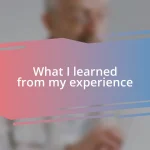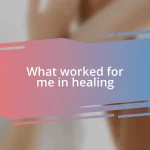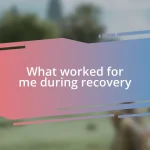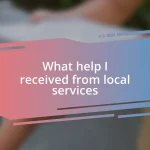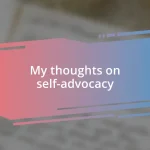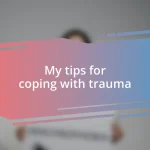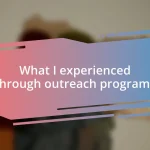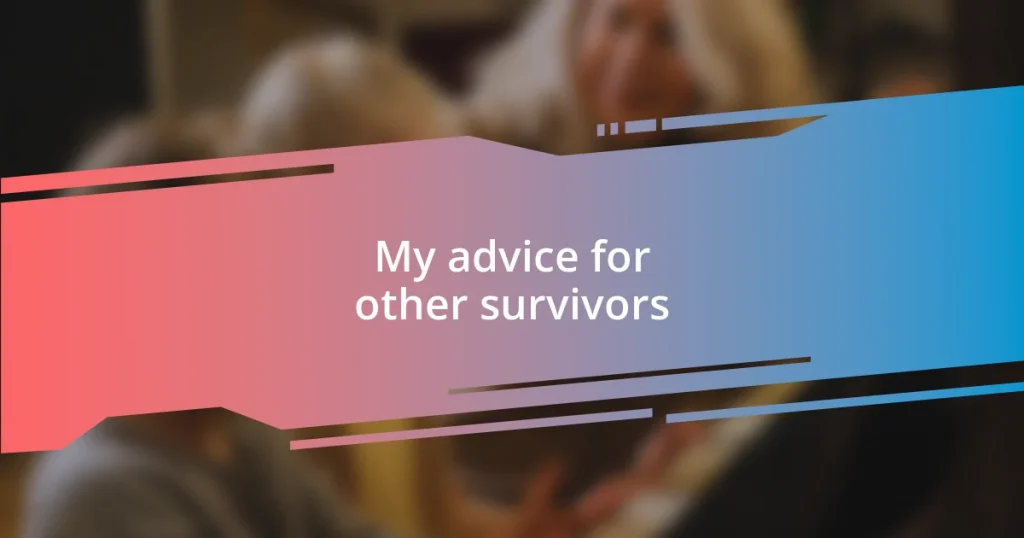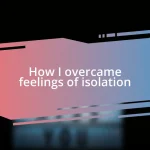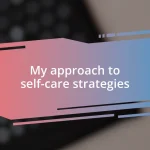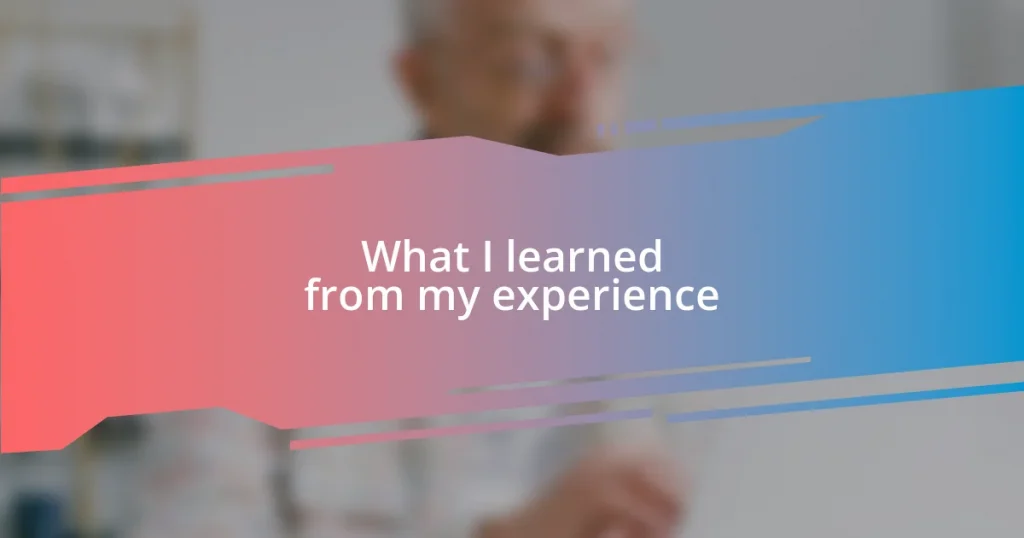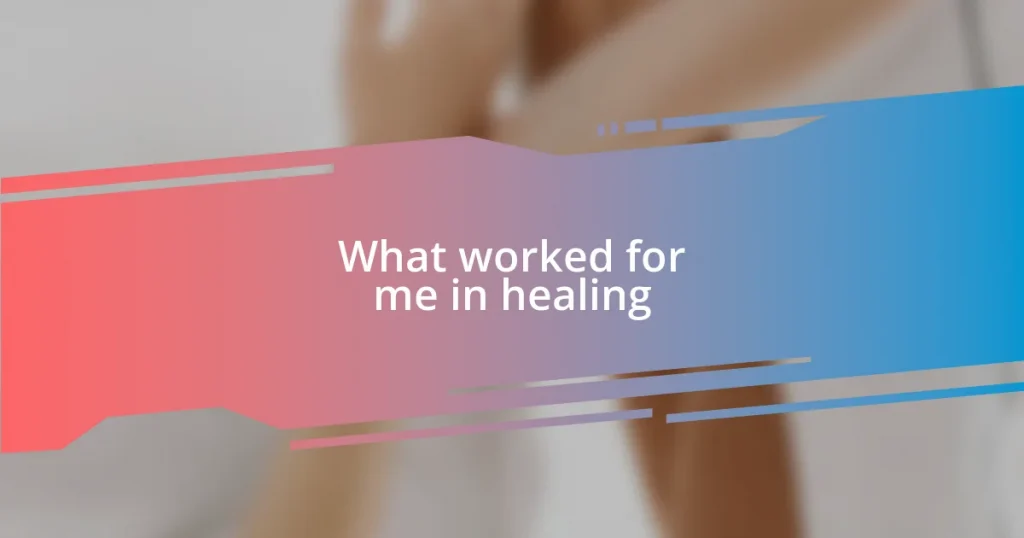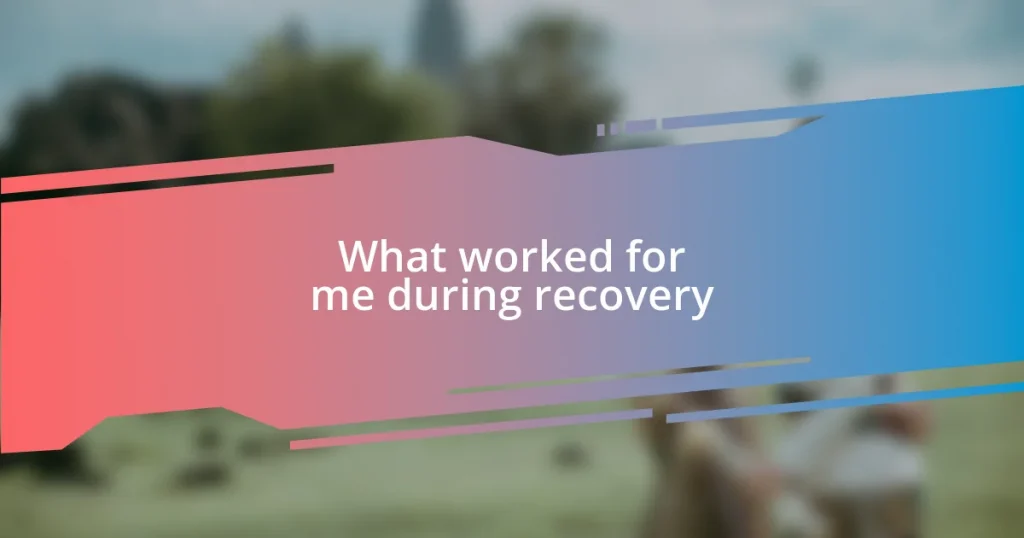Key takeaways:
- Understanding that healing is a non-linear journey emphasizes the importance of embracing setbacks as opportunities for growth.
- Finding community support, whether in-person or online, is crucial for recovery, providing a sense of belonging and shared resilience.
- Practicing self-compassion and setting realistic goals fosters personal empowerment, allowing for meaningful progress in the healing process.
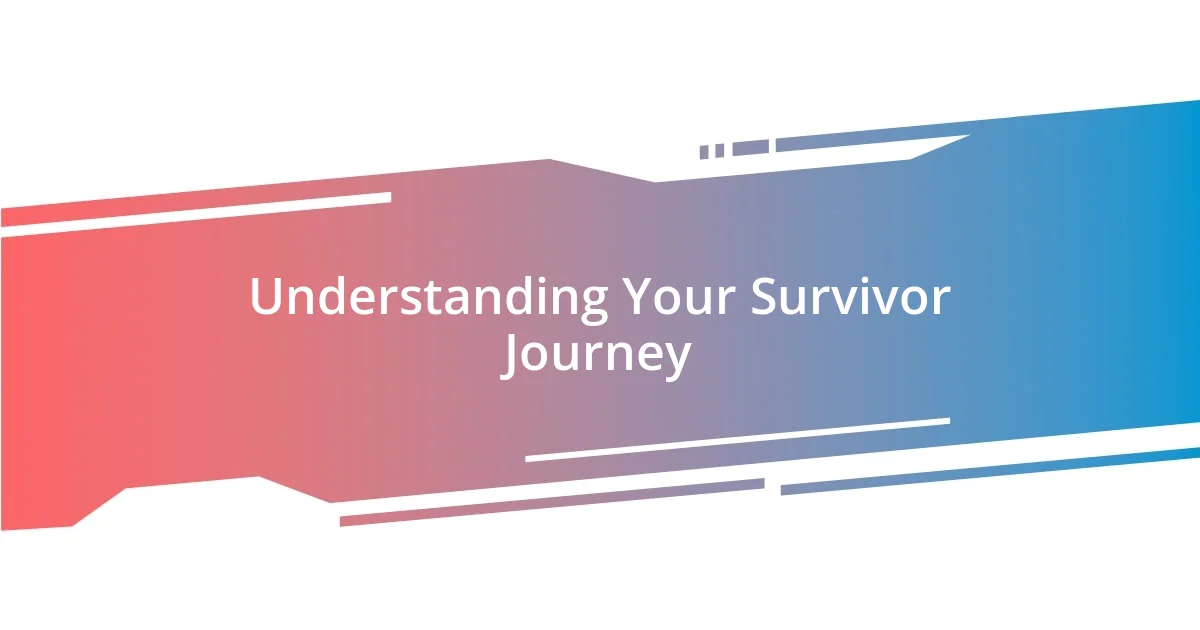
Understanding Your Survivor Journey
Understanding your survivor journey is an intensely personal process. For me, it felt like I was wandering through a dense fog—each step revealing more about my strength and resilience. How often do we underestimate our ability to endure when faced with challenges?
As I navigated my path, I discovered that healing isn’t linear; it twists and turns like a winding road. I vividly remember one moment—sitting on the floor, tears streaming down my face, realizing that every tear was a step toward my strength. Have you experienced these moments of clarity? They’re powerful and remind us that our emotional reactions are valid.
I learned to embrace each phase of my journey, understanding that setbacks can often lead to profound growth. It can be disheartening to face hurdles, but I’ve found that sometimes those very obstacles illuminate the way forward. Have you noticed how confronting your pain can spark unexpected insights? These moments can be transformative, inspiring us to appreciate the progress we’ve made along the way.
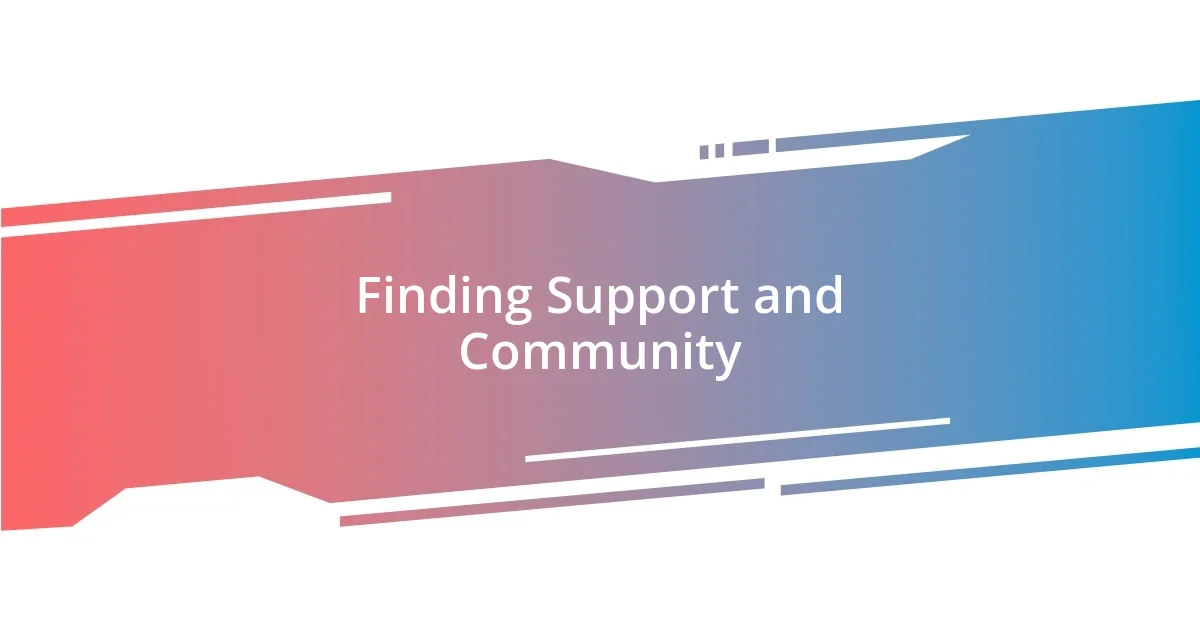
Finding Support and Community
Finding support and community has been one of the most crucial aspects of my healing journey. I remember the first time I reached out to a local support group. Walking into that room filled with strangers felt intimidating, but as I shared my story, I instantly connected with others who understood my experience. Does it surprise you how comforting it can be to find people who genuinely relate to your struggles?
Communities, whether online or in-person, can offer a sense of belonging that is vital in recovery. I often turned to online forums where individuals shared their triumphs and challenges, creating an environment of understanding and empathy. The power of collective healing is remarkable; it reminded me that I wasn’t alone, and others were navigating similar waters. Have you thought about where you might find your community?
Building relationships within supportive groups can also provide practical advice and strategies for coping. I have learned so much from others’ stories; their tips often resonated with my own experiences, giving me new tools to handle my challenges. The beauty of community lies in its diversity—every story is unique, but the thread of resilience weaves us together in a tapestry of hope.
| Type of Support | Benefits |
|---|---|
| In-person Support Groups | Face-to-face connection enhances empathy and understanding. |
| Online Communities | Accessibility and a wider range of perspectives. |
| One-on-one Counseling | Personalized guidance tailored to individual needs. |
| Peer Mentoring | Encouragement from someone who has walked a similar path. |
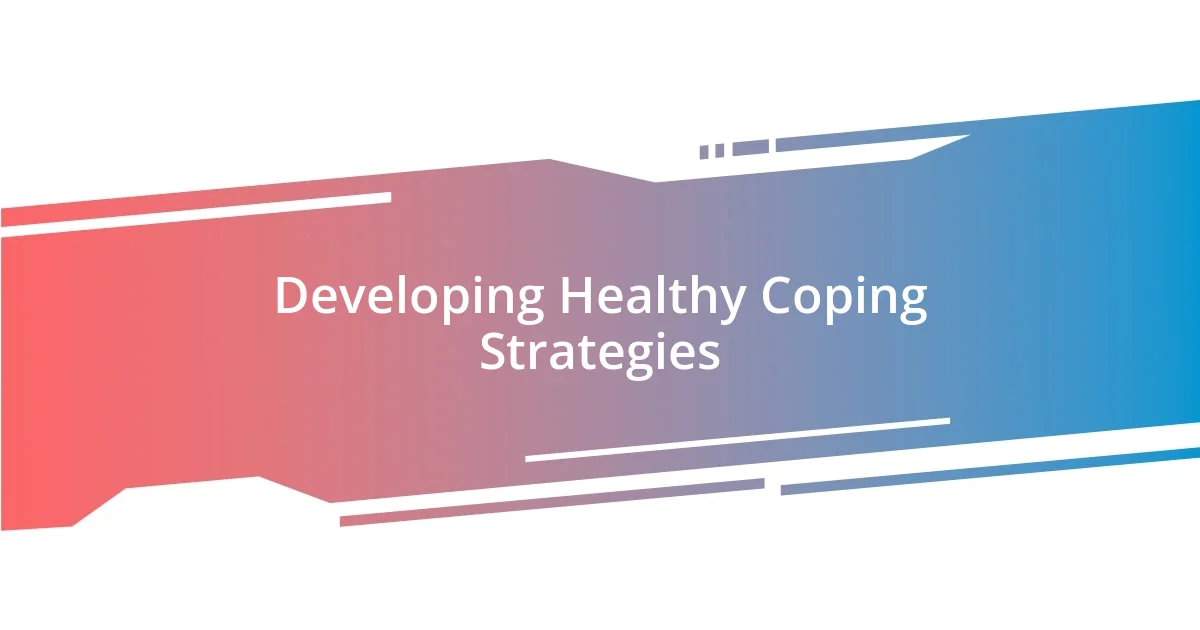
Developing Healthy Coping Strategies
Developing healthy coping strategies has been a game-changer in my healing journey. I remember one particularly overwhelming day when I felt consumed by anxiety. In that moment, I decided to take a simple walk outside, focusing on each step and the beauty around me. That small act of grounding myself helped clear my mind and brought a sense of calm. Have you found certain activities that provide a similar respite? It’s all about discovering what techniques resonate with you.
There’s no one-size-fits-all approach, so experimenting with different strategies can be enlightening. Here are some coping mechanisms that I’ve found particularly helpful:
- Mindfulness Meditation: Taking just a few minutes to be present can transform my day.
- Journaling: Writing down my feelings allows me to process emotions rather than holding them inside.
- Physical Exercise: Whether it’s a short jog or a yoga session, moving my body releases stuck energy and boosts my mood.
- Creative Outlets: Painting, crafting, or simply doodling has become a therapeutic release for my emotions.
- Nature Immersion: Spending time outdoors, even just in my backyard, reconnects me with myself and provides clarity.
These strategies not only help me cope but also invite me to connect deeper with myself during challenging times. I encourage you to explore what works for you; sometimes, a little trial and error can lead to meaningful discoveries.
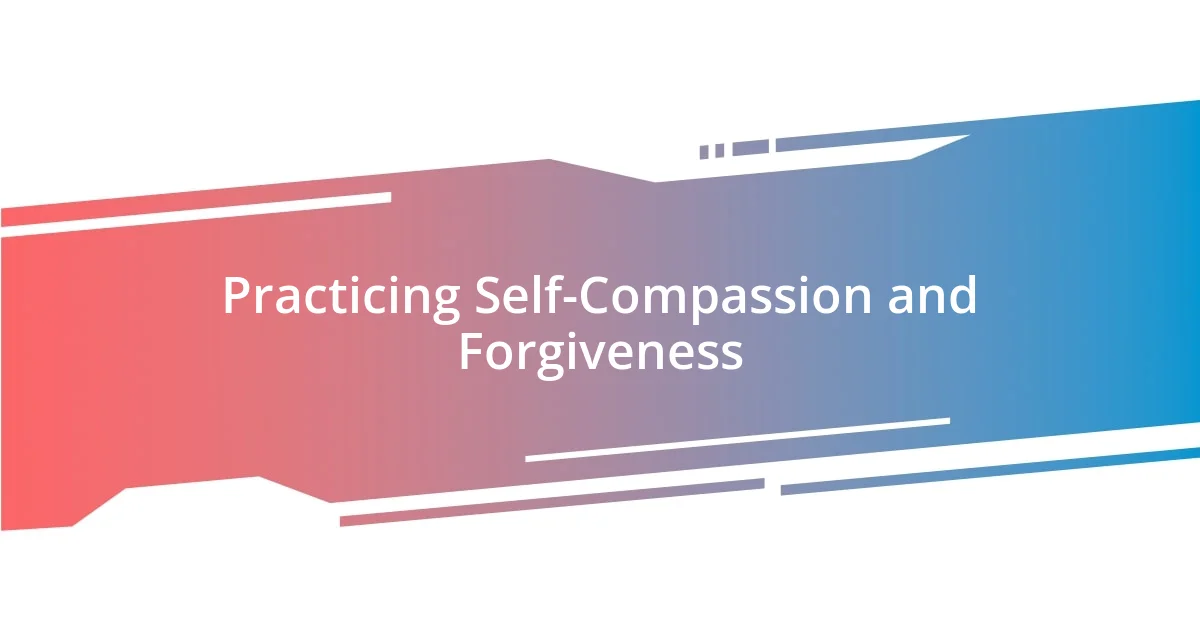
Practicing Self-Compassion and Forgiveness
Practicing self-compassion can be a difficult yet essential part of healing. I vividly remember a moment when I berated myself for a setback. Instead of letting it spiral into negativity, I chose to treat myself as kindly as I would a friend in the same situation. Have you ever experienced that internal critic? Shifting my perspective to self-compassion helped me to embrace my imperfections and remember that healing isn’t linear.
Forgiveness plays a pivotal role in this journey. For a long time, I held onto feelings of resentment towards myself for choices I made during difficult times. One day, I realized that carrying that weight wasn’t aiding my recovery—it was hindering it. I decided to write a letter to myself, expressing understanding and acceptance of my past actions. Have you thought about forgiving yourself for your own mistakes? That act of grace allowed me to let go and find peace, which ultimately contributed to my healing process.
It’s remarkable how integrating self-compassion and forgiveness can transform your outlook. I often visualize a nurturing space within me, filled with understanding and kindness, especially when I face challenges. During tough moments, I mentally return to that warm, supportive space. This practice reminds me that it’s perfectly okay to be gentle with myself. Have you considered creating your own place of compassion? Embracing this mindset has been a powerful tool for me, cultivating resilience and hope as I continue my healing journey.
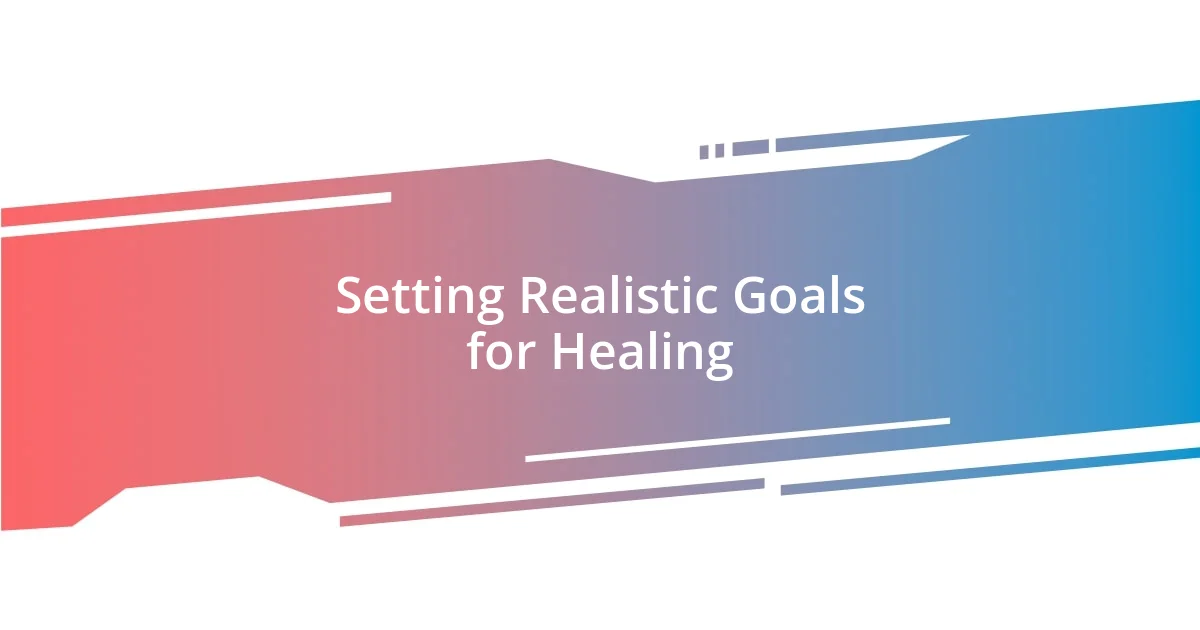
Setting Realistic Goals for Healing
Setting realistic goals for healing can truly be the foundation on which you build your recovery journey. I recall a time when I was filled with ambition, wanting to feel “normal” overnight. It wasn’t until I set smaller, attainable goals—like drinking enough water daily or practicing gratitude—that I felt genuine progress. Have you ever felt overwhelmed by the desire to rush your healing? Sometimes, breaking those larger aspirations into bite-sized pieces makes the journey more manageable.
One of the most pivotal moments for me was when I realized that it’s perfectly fine to have days where I accomplish little. I remember making a list every morning, prioritizing things like “take a shower” or “read a chapter.” Those goals felt simple, yet they carried immense value. Did you know that even the smallest victories can fuel motivation? I learned that celebrating those little achievements—even acknowledging that I simply got out of bed—could shift my entire perspective.
As you navigate your healing, I encourage you to be gentle with your expectations. It can be freeing to understand that setbacks are not failures; they are simply part of the journey. A few months ago, I felt stuck in my progress, and rather than push myself harder, I decided to embrace rest. Have you considered that sometimes, the best action is just to pause? Allow yourself to recalibrate your goals regularly, ensuring they reflect your current emotional state and energy levels. Each step, no matter how small, counts towards your healing, and that realization can be incredibly empowering.
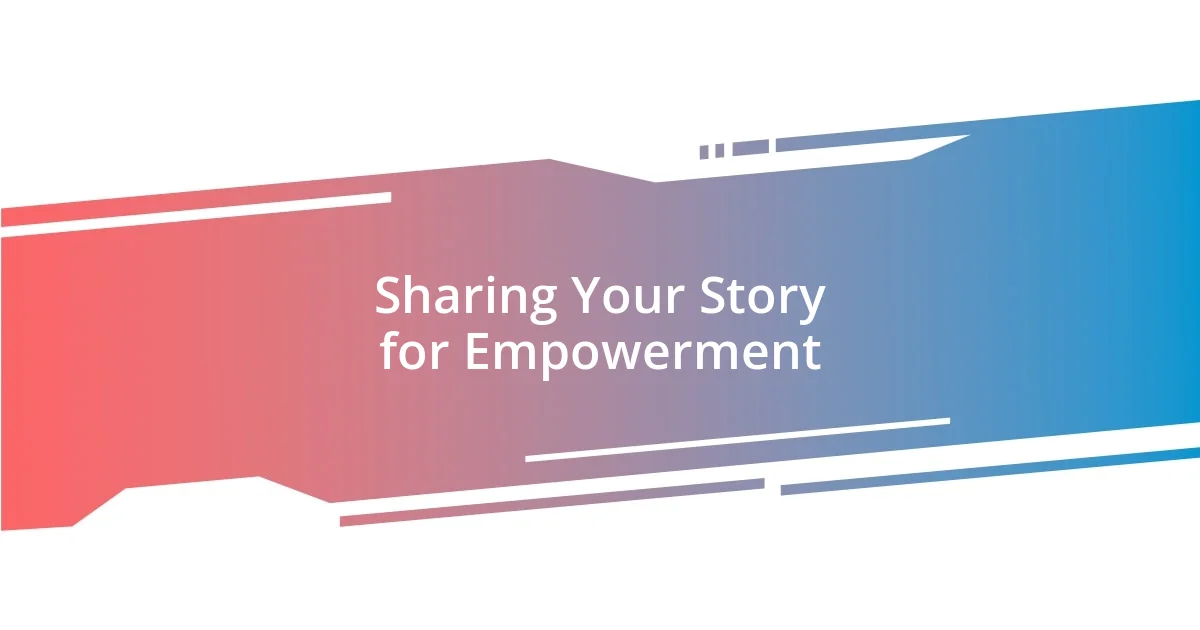
Sharing Your Story for Empowerment
Sharing your story can be an incredibly empowering experience. I remember the first time I opened up about my journey during a support group meeting. The relief that washed over me as I shared my vulnerabilities was profound. Have you ever felt that weight lift when you finally voiced what you’ve experienced? It’s in those moments that I discovered how my narrative could resonate with others, creating a sense of connection and community.
Expressing my experiences also helped me to reclaim my voice. There was a time when I felt silenced by shame; sharing my story helped me gain back the power I thought I lost. One particular instance stands out: I wrote an article about my struggles, and much to my surprise, it catalyzed conversations among my friends and family. Suddenly, I wasn’t just a survivor; I became a source of inspiration for others. Have you considered that your story might be the guiding light for someone else? There’s an undeniable strength in vulnerability, and it paves the way for healing—not just for you, but for those who hear you.
Moreover, sharing my story wasn’t just a one-time event; it became a part of my daily life. I found myself seamlessly integrating my experiences into casual conversations, and each time I did, it reinforced my journey and the lessons learned. I even began to fearlessly advocate for mental health awareness on social media. It was liberating to voice my truth publicly. What if your narrative could spark change or motivate someone who’s struggling? Telling our stories builds bridges, generates empathy, and reminds us that we are not alone. Embracing this process has shown me that my story is a powerful tool—one that has the potential to empower not just myself, but others navigating their paths to healing.
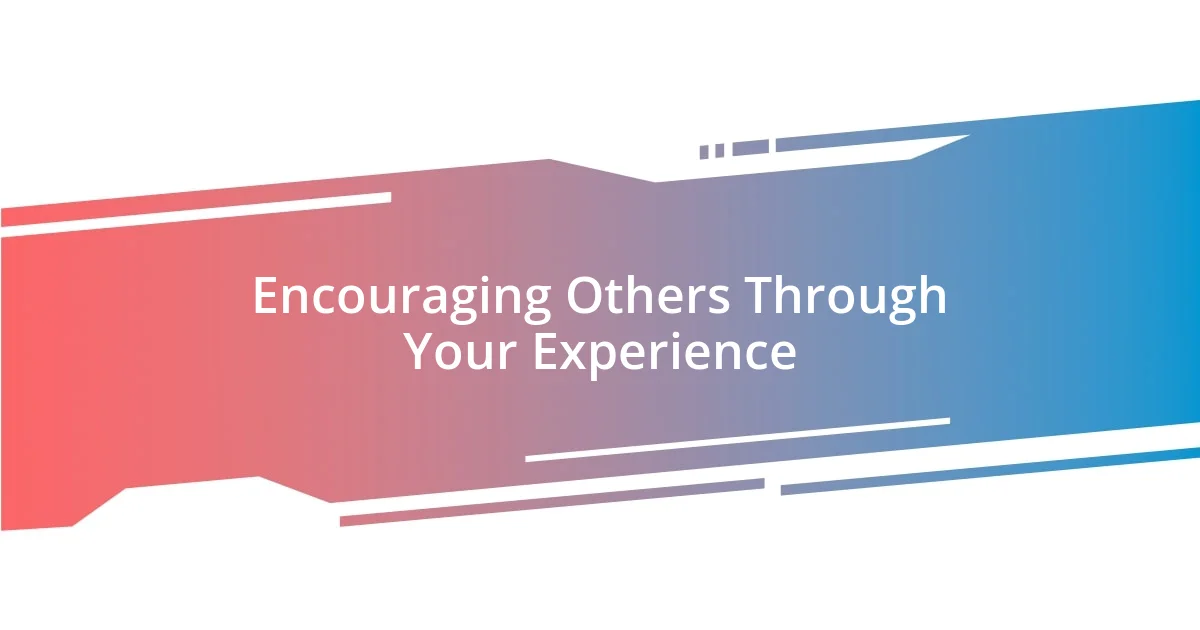
Encouraging Others Through Your Experience
Encouraging others through sharing my experiences has been one of the most fulfilling aspects of my recovery. I vividly remember a moment when a friend reached out, sharing how my story of resilience inspired her to seek help for her own struggles. Have you ever felt that surge of hope when someone acknowledges the impact you’ve had on their journey? It’s such a rewarding feeling to recognize that our battles can illuminate the paths for those who feel lost.
I’ve realized that encouragement often comes from simply being authentic and relatable. One day, I shared a post online about a particularly tough day where I felt overwhelmed and raw. To my surprise, several others responded with their own stories, creating a safe space for mutual support. Isn’t it incredible how being open about our struggles can foster connections we never knew we needed? I learned that vulnerability isn’t a weakness; it’s a beacon of hope for others.
Each time I encourage someone, I reflect on the lessons I’ve learned along the way. A few months ago, I mentored a newcomer in a support group and shared the challenges I faced in my early days. Witnessing her transformation as she began to believe in her own strength filled me with immense gratitude. Have you ever experienced that joy of watching someone else thrive because of your support? It reminds me that by shining a light on our experiences, we contribute to a collective healing journey, one story at a time.
